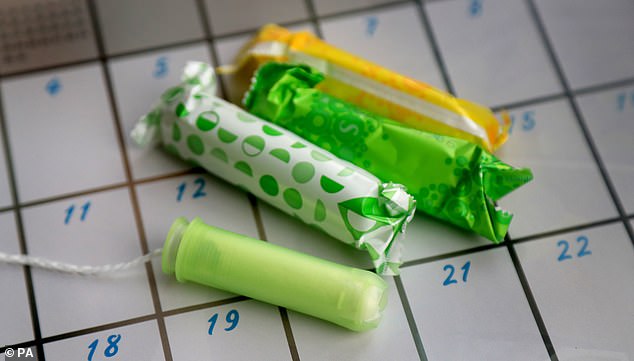Some tampons found to contain LEAD and other toxic metals that could be absorbed into the body, alarming study suggests

[ad_1]
Toxic metals could be lurking in tampons sold in the UK, an alarming investigation revealed today.
Tests on 30 products purchased in New York, Athens and London found some contained dangerous levels of arsenic, chromium and even lead.
And all 16 metals tested were detected in at least one tampon.
Exposure to lead can impair brain development, whist other metals can trigger life-threatening blood clotting and raise the risk of some cancers.
US researchers claimed the probe showed tampons were ‘a potential source of metal exposure’ for women.

Tests on 30 products purchased in New York, Athens and London found some contained levels of arsenic, chromium and even lead. And all 16 metals tested were detected in at least one tampon. Exposure to lead can impair brain development, while other metals can trigger blood clotting and even raise the risk of some cancers
However, experts urged women not to panic and cautioned more research was required to discover of there is any danger to users.
While some of the products are available in the US, with others in the UK and EU, researchers chose not to name the items or 14 brands involved.
Dr Jenni Shearston, an expert in the epidemiology of air pollution at the University of California, Berkeley, said: ‘Despite this large potential for public health concern, very little research has been done to measure chemicals in tampons.
‘To our knowledge, this is the first paper to measure metals in tampons.
‘Concerningly, we found concentrations of all metals we tested for, including toxic metals like arsenic and lead.’
Professor Kathrin Schilling, an assistant professor and geochemist at Columbia University, added: ‘Although toxic metals are ubiquitous and we are exposed to low levels at any given time, our study clearly shows that metals are also present in menstrual products, and that women might be at higher risk for exposure using these products.’
Possible heavy metal exposure via tampons is concerning given the thin nature of the internal tissue of the vagina could provide an easy way for these substances to enter the body.
The findings are also potential far reaching with about 50 to 80 per cent of women who menstruate using tampons on a monthly basis — for several hours at a time.
Under the study, the 16 metals tested included arsenic, barium, calcium, cadmium, cobalt, chromium, copper and iron.
Manganese, mercury, nickel, lead, selenium, strontium, vanadium, and zinc were among the others.
Researchers identified examples of all 16 among the tampons tested.
Several metals were detected in all samples, including arsenic, cadmium, chromium, lead and vanadium.
Among these lead had the highest concentration with a mean total of 120 nanograms per gram (ng/g).
Cadmium followed at 6.74 ng/g, with arsenic logging 2.56 ng/g.
Writing in the journal, Environment International, researchers said: ‘There is no safe exposure level to lead.
‘Any proportion of lead that may leach out of a tampon and reach systemic circulation might contribute to negative health outcomes.’
No brand or type of tampon had notably lower levels of metals overall, they added.
Organic tampons had higher levels of arsenic, but non-organic tampons had higher levels of lead.
The authors said there were several ways the metals could have become embedded into tampons in the first place.

It comes just weeks after US consumer watchdog group Mamavation and the Environmental Working Group also suggested tampons could contain harmful perfluoroalkyl substances or PFAS. Dubbed ‘forever chemicals’ because they can linger in the environment for hundreds of years, they have been linked to everything from cancer and high cholesterol to infertility
One was that the cotton plants used to manufacture tampons could have absorbed the metals from soil and water, particularly when there are nearby contaminants, for example, a cotton field near a lead smelter.
They can also be potentially added during manufacturing processes as whiteners, antibacterial agents, or through cross-contamination from other factory processes.
Dr Shearston said: ‘I really hope that manufacturers are required to test their products for metals, especially for toxic metals.
‘It would be exciting to see the public call for this, or to ask for better labelling on tampons and other menstrual products.’
Experts, however, urged women not to panic and cautioned there was ‘no evidence that the metals would leech into menstrual blood’.
Professor Atholl Johnston, a professor emeritus of clinical pharmacology at Queen Mary, University of London, told MailOnline: ‘I don’t doubt the research findings, but I do doubt the bioavailability of the metals found in the tampons.
‘Prior to analysis, the tampons were cut up and then the researchers added 2 mL of 67-70 per cent nitric acid (HNO3) to each sample and pre-digested the tampons at room temperature overnight before microwave-assisted acid digestion.
‘Hardly a similar environment to the average vagina.’
He added: ‘Were I a tampon using woman, I wouldn’t panic at this stage.
‘There is no evidence that the metals would leech into menstrual blood and be absorbed into the body.’
It comes just weeks after US consumer watchdog group Mamavation and the Environmental Working Group also suggested tampons could contain harmful perfluoroalkyl substances or PFAS.
Dubbed ‘forever chemicals’ because they can linger in the environment for hundreds of years, they have been linked to everything from cancer and high cholesterol to infertility.
Mamavation found popular Playtex tampons, Always liners and Carefree liners, all sold in the US, tested positive for organic fluorine, a chemical that contains known PFAS.
Playtex sport contained 19ppm, while the Always liners had 21ppm of the chemicals and the Carefree product had 17ppm.
Last year, some period pants sold by high street retailers in the UK were also found to contain high levels of silver.
Silver is used as an antimicrobial agent and is typically added to period pants to combat user concerns about smell and hygiene.
However, scientists have discovered nanosilver can kill lactobacillus, the healthy bacteria in the vagina that help fight off infection.
This can put period pant users more at risk of harmful bacteria, potentially leading to an increased risk of bacterial infections and pregnancy complications.
[ad_2]
Source link




